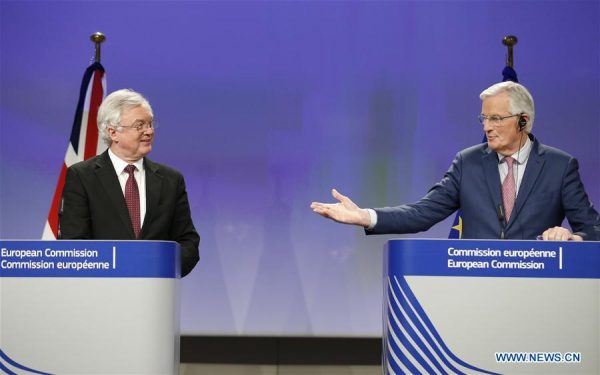
BRUSSELS – Burning the midnight oil for many days, negotiators from both sides of the English Channel agreed on Monday on a “large part” of a transitional agreement of Brexit, paving the way for Britain’s orderly withdrawal from the European Union (EU).
“A good deal for the EU and Britain is closer than ever before,” said Britain’s Brexit Secretary David Davis during a joint press conference with Michel Barnier, the chief Brexit negotiator for the EU.
Hailing the deal as a “decisive step”, Barnier and Davis said they had agreed on a “large part” of terms for a transitional deal but issues still to be resolved, such as the Northern Ireland border.
Britain agreed to a contentious “backstop solution” which would keep Northern Ireland signed up to EU rules in order to avoid a hard border with the Irish Republic, said the deal.
This would mean Northern Ireland would stay in EU customs union and parts of the single market if no other solution was found.
As for citizens’ rights, European citizens from the 27 states of the EU who arrive in Britain during the transitional period will have same rights as citizens who arrived before the Brexit, said the deal.
“For citizens, we are proposing in this text today an additional option, with the possibility of obtaining the new residency status in the United Kingdom, from the beginning of the transition period. And this option will allow citizens who so wish, to have immediate legal certainty on their right of residence after the transition period,” said Barnier.
Britain will stay in the single market and customs union for 21 months after it leaves the EU in March 2019 and will be able to sign new free trade deals during the transition — but they won’t come into effect until after the period has ended, said the deal.
“During this period, the United Kingdom will no longer participate in the decision-making process of the European Union…It will, however, retain all the advantages and benefits of the single market, the customs union, and European policies, and will therefore also have to comply with all European rules, just like the member states,” said Barnier.
“We are committed to working during this period in good faith and to continuing to respect the principle of loyal cooperation,” he said, adding that “this time of transition will be the one during which we will have to finalize our future relationship.”
However, “the transitional period will only come after everything is agreed,” said Barnier.
Meanwhile, any agreement reached at the summit this week will be a political commitment, but not legally binding until the final withdrawal agreement is signed early next year, according to some local media.
British Prime Minister Theresa May sent a notification letter to the EU in late March last year, triggering a two-year countdown to Britain’s withdrawal from the bloc after more than 44 years of membership.


